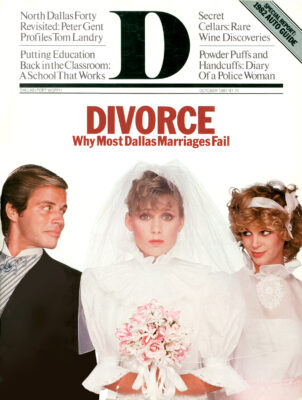Thinking about divorce is like rambling through a cemetery: The reality may be grim, but the note of whimsy is hard to avoid. Like an old stonecutter, I find myself carving irreverent epitaphs over some of the dead marriages in the churchyard of my mind.
Jo Anna and Michael Montgomery. May You Rest in Peace. 1966-1974. First million raised (his): 1969. Consciousness raised (hers): 1971. Roof raised (by him): 1971. Boom lowered (by her): 1974. “… you’ve come a long way, baby.”
Greg and Priscilla Cunningham. Unrest Eternal. 1976-? Trial separation: 1978-1980. Real litigation: 1980-1981. Final divorce: nowhere in sight.”… all I want is …”
Tom and Debby Richardson. May You Rest in Peace. 1973-1980. Issue: Faith (1973); Hope (1975); and Therapy (1977). “… and the greatest of these is not therapy.”
Fred and Harriet Clark. Asleep At The Switch. 1950-1979. Affairs (his): 1954, 1958, 1963, 1971, 1978. Graduate courses (hers): French, 1955; Italian, 1959; Swedish, 1964; Danish, 1972; Finnish, 1979. . . . in 27 languages she never learned to say, ’Cut that out!’ “
As I browse among the headstones, though, I have another thought about all these marriages that lie beneath the sod of memory. Was it mere coincidence that so many of them succumbed in the same era? Is there no common factor here? Was it just that Harriet was too mousy, Tom too dewey eyed, Fred too devious, Priscilla too grasping, Michael too driven, and Jo Anna too much? Is it simply that the Love Boat is always a ship of fools and the marrying compulsion is ultimately idiotic -a vision so private and unique to each that, whether it succeeds or fails, no public sense can ever be made of it?
Maybe it’s unrealistic to seek a single cause for the epidemic of divorces, but my mind rebels against chalking them up to merely personal moral failings multiplied by a population factor. Mightn’t there be, if not one master reason for the plague, at least something about the late 20th century that predisposes us to catching it?
Maybe it’s medical progress: We don’t make it “till death us do part” because we live too long. Human beings were always better at breaking up than at anything else; when death fails to arrive as early as it used to, life gets impatient and does the job itself.
But that’s just feeble cynicism; nobody I know lives by such a philosophy. However much we put each other asunder, we go right on being true believers in the unquestioned goodness of joining together. Half our marriages may end in divorce, but 80 per cent of the divorced remarry.
Still, I ask myself, why all the breakups? Maybe the moralizers are right: They blame everything else on the permissiveness of the times; why not the rash of divorces as well? Maybe if we hadn’t pensioned off the old hard-line ecclesiastical and social counselors, there’d still be enough muscle around the camp to make sure everybody was where he belonged at bed check.
That, too, gets dismissed, however. On the one hand, screaming “permissiveness” seems to imply that marital failure is something that didn’t exist until the moral monitors fell down on the job. But that’s nonsense. Divorce, if you take the word in its etymological sense of “separation,” has always been more common than unity in marriage -bad performances outnumber the good ones in every activity.
On the other hand, by the way moralizers harp on “softness,” they show they understand perfectly well that marital discord has always existed. Sure, they admit, most marriages have dangerous heads of steam in them; but if we hadn’t gone all squishy with our permissiveness, we would still keep the pot boiling for the sheer character-building quality of the experience. They will allow us to hope, of course, that by prayer, therapy, or luck, we might lower the pressure a bit. But if none of those work, it still makes no difference. To some people, 20th century antsiness is the only real cause of divorce; get rid of that and there will be no marital problems that a heavier hand on the lid can’t cure.
But that, I decide, is even bigger nonsense. The most I’ll allow anybody to lay at the door of our times is that we have, wisely or foolishly, finally gotten the nerve to do something about our separations – to recognize our divorces with a small “d” and to admit them publicly by Divorce with a capital. We didn’t invent sin in the last 30 years. Probably, we haven’t even increased the standard interpersonal distance between husbands and wives. It’s always been something like half an ocean – even when you included the good marriages, where the distance is only as wide as the Mississippi.
I find myself suddenly tired of explanations that hang our troubles on moral failings, as if life were a contest in deportment with prizes for only those who didn’t lower their standards. Doesn’t everyone see by now that there never were prizes like that, and that the troubles produced by lowered standards are bush league compared to the botches we make in the name of high ones? It’s the righteous grand designs that start wars. Man’s worst usually does only neighborhood damage. It’s his brightest and best that destroy worlds.
Accordingly, I decide to take a different tack on the question of Divorce. How about blaming it on high standards for a change? And I don’t mean “high” in any underhanded sense: None of that snide business about marriages failing because we put too high a value on personal gratification. That’s just another way of saying we put too low a value on humility, patience, or general wonderfulness. No, I want to blame it on genuinely high standards-standards so high, in fact, that they are for all practical purposes, new. I have a strong suspicion that no other age has ever expected the level of matrimonial achievement we now routinely demand; and I think that expectation is the biggest single reason for divorce. Where everybody crawls, nobody breaks his neck falling out of the sky. The troubles begin when flying lessons become popular.
We arrived at such high standards by mixing apples and oranges -we included with the more or less manageable demands of matrimony the exalted and inconvenient demands of another human experience altogether: romance. This coalescing has been going on for a long time, but it’s only in our age that its full effect has begun to be felt.
Romantic love, as western civilization knows it, is an invention of certain French medieval poets -the troubadours. They did not invent the romantic experience as such; that had been around, presumably, as long as human nature. But earlier cultures-the Greeks and Romans, for instance-took a sensibly dim view of romance: It was an infatuation that produced more heat than light; when it passed, as it always did, people could get back to doing reasonable things with their lives.
On the other hand, the romantic event, in the songs of the troubadours, was portrayed not as a nuisance, but as an ennobling experience: To be smitten by the wonder of the beloved was to receive a sacrament of the love that made the world. What had once been a slightly shabby feeling was transformed into a glorious metaphysical fact. The tiny boat of infatuation was swamped in a sea of importance, and, as far as anybody can tell, it has stayed swamped ever since. The invention of romantic love was one of the great revolutions in human history – right up there with the advent of fire and the invention of the wheel. Boy meets girl has never been the same.
At first, however, the race made no connection between marriage and romance. Indeed, it couldn’t: Romance presupposed grace, freedom, and equality between the partners; medieval marriage, like most other things in the era, was a matter of debt, servitude, and rank. The first heroes and heroines of romantic love were all, quite naturally, adulterers-Lancelot and Guinevere, Tristan and Isolde. The knight’s lady was somebody else’s wife; he met her freely and equally because he met her outside of matrimony. It simply never occurred to either of them that marrying and living happily ever after had anything to do with the romantic case.
So it went for hundreds of years. People fell in love and people married, but the two activities gave each other a wide berth. Romance was something children got involved in; marriages were sensible enterprises arranged by parents. A little of the aura of a love affair might be considered acceptable at a wedding; but no one made a point of it, and certainly, no one ever thought it should last.
But then another revolution in human consciousness occurred, every bit as earth-shaking as the romantic one. For the first time in history, the startling notion was formulated that all human beings are equal and that they should, accordingly, all be free. The Declaration of Independence was a radically new political philosophy; the abolition of slavery was something almost no one, not even a Jesus or a Paul, had ever advocated on principle before.
If you take the romantic revolution of the 13th century and follow it up 500 years later with a political revolution that says freedom is the law and equality is real, you can hardly blame people for trying to play the combination.
Which is, of course, what they did – and have kept doing to this day. The 19th century saw the budding of the idea that romance and marriage should go together; the first half of the 20th century saw it flower into a conviction; and now, we’re the ones who have the job of digesting the hybrid fruit. Small matter that the two have not proved compatible. Not to worry that the standards for romance are as high and short as those for marriage are low and long. The combination simply looked too good not to bet on it: adventure and stability, freedom and commitment, equality and hierarchy. So bet we did, every last man Jack and woman Jill.
You question that? So do I, but only briefly. The words “sexual revolution” went through my mind, too. I thought of the countless multitudes who have passed beyond both marriage and romance and are now bunny-hopping their way toward kingdom come. But I’m convinced the sexual revolution exists chiefly in the minds of magazine writers and other hand-wringers. The widely-touted liberty of license that’s sweeping the country has hardly changed a thing. The folks out there in the front beds may feel slightly easier about climbing between the sheets, but what they’re still looking for is romance and marriage. So what if they call it “living together”?
The essence of the romantic attachment is that it takes a perfectly ordinary human being and decides not only that he/she is the greatest thing since the electric pencil sharpener, but also that this hapless beloved should, for just that reason, be put ahead of everything else in the lover’s life.
On one level that’s heady stuff. When somebody tells me I am absolutely first in line-that there are no people, things, principles, ideas, causes, concepts, notions, or whims that will ever come before me–l quite naturally rejoice. And when someone takes that romantic gift and wraps it in the pure-spun gold of a lifelong promise to keep me at the head of the queue, I can be deliriously happy -content at last that the old inequities of marriage will never plague me again.
Nor is it foolish of me to be glad. It’s not as if marriage were just recently having some alien standard foisted upon it. Even in its oldest forms, it called for extravagant promises: To forsake all others, to worship one’s spouse with one’s body, and to put all one’s worldly goods in the service of the beloved, were not exactly piker’s offers.
And yet, with the circumstances surrounding such promises in earlier times, there always came a certain understanding. First place in line was given within reason, according to custom. And that meant (for as long as people were willing to put up with it) that husbands, for example, were allowed to put their occupations ahead of any businesses their wives might have, and that wives might put their sexual prudishness before their husbands’ desires. Such things may have been good or bad; but in any case, they served to water down the 200-proof promises a bit. Most people could indulge in them without developing a hangover.
That’s an advantage we’ve thrown away since we started drinking romance and marriage together. The combination, unfortunately, is not a mixed drink; it’s a double shot that leaves our heads throbbing most of the time. It’s tempting, therefore, to ask whether there’s any chance we might be able to back up and regroup. Maybe our relationships would be better if we could cut our expectations for marriage down to a reasonable size again.
I’m afraid, though, that the answer is “No.” Real revolutions in human consciousness are one-way passages. Having negotiated them, we may proceed to marvels or to messes, but we can’t ever go back to the way things used to be.
But the other reason for not trying to unscramble marriage and romance is more positive. However hard, inconvenient, and extravagant it may be to take a burst of romantic generosity and turn it into a lifetime commitment to putting another person first in your life, it is -if it works even to a moderate degree -an immoderately good idea.
Think of it. No promise in the world can hold a candle to it. You take two people and put them into a relationship in which neither one of them will ever have to think about himself again because the other has taken on the job. Think of the relief! So what if the odds are against it? The prize is so valuable that even a non-gambler could hardly resist taking a chance. No, if the abundance of divorces is due to our failure to live up to the high standards we’ve set for marriages – and if there’s no way of toning down those standards -I’m afraid there’s only one way out of the impasse: Start living up to them.
The temptation, of course, is to apologize for such an obviously idealistic conclusion, but I won’t do that because there are two separate exhortations concerning ideals. The first is the useless business of urging people, for the thousandth time, to do what they’ve always known they should do.
The second exhortation, however, urges them to a level of performance so high that it simply hasn’t occurred to them. By way of illustration, take a piano student who welshes on his 15-minute daily practice period. Instead of nagging him to put in the full quarter hour, you urge him to do four hours in a row. The advice may or may not work, but one thing is certain: It gets his attention. The concept of no-fooling piano playing is finally out on the table.
Accordingly, what advice I think I would offer at the end of this stroll through the marital graveyard is something equally extreme. Since there is no sign that we seriously intend to separate romance and marriage, the only thing left for us to do is shock ourselves enough to get the subject of no-fooling romantic marriage back on the table.
The advice, therefore, is simply this: Go ahead and consistently put your marriage partner first in every line in your life. Absolutely first, without a single exception for any person, thing, or abstraction, and in particular, with no exceptions for yourself. Like everyone else in this age, you have, wisely or foolishly, opted for a style of matrimony that will work only if each partner makes a lifetime effort to put himself second. Swallow hard, take the bit in your teeth, and do just that.
And if you’re tempted to balk and tell me it’s just too much to ask of human nature, I have an answer for you: Of course it is. But then, life itself asks too much of human nature. We die, in the long run, of being born; our marriages end, well or badly, simply because they began. Everything notable about us is something that on most days is more than we can handle. But if that didn’t stop us at our good moments -at the times we committed ourselves to the romantic matrimonial extravagance, say, or to the bizarre notion that having children would be great -why should it stop us now?
Our best was never done on the basis of looking out for number one. Marriages where that has been the rule -Jo Anna and Michael’s, Fred and Harriet’s, and perhaps yours as well -all end up with nothing but a headstone for their pains. So don’t be afraid to put yourself second. Who knows? With a little luck, you might just inspire someone to put you first.
Related Articles

D CEO Award Programs
Winners Announced: D CEO’s Financial Executive Awards 2024
Honorees in this year’s program include leaders from o9 Solutions, Baylor Scott & White, and Texas Capital, as well as our Constantine ‘Connie’ Konstans Award winner Mahesh Shetty of ILE Homes.

Basketball
What We Saw, What It Felt Like: Mavs-Clippers Game 2
A gritty game draws Dallas even in the series.
By Iztok Franko and Mike Piellucci

Baseball
What Should We Make of the Rangers’ Accidental Youth Movement?
It's been 26 years since a defending World Series champion leaned on this many young players out of the gate. In Texas' case, that wasn't the plan. But that doesn't make an influx of former first-round picks a bad thing, either.


